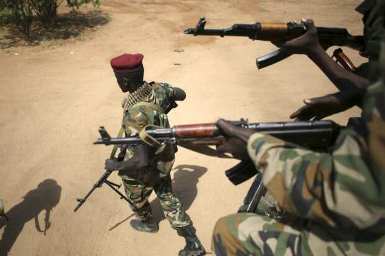S. Sudanese react cautiously to ceasefire agreement
January 24, 2014 (JUBA) – South Sudanese citizens and civil society organisations have reacted cautiously to the signing of a ceasefire agreement between the government and rebel movement, amid fears it will do little to halt ongoing violence in the country.

The deal, signed in the Ethiopian capital of Addis Ababa on Thursday, calls on the two sides to immediately cease hostilities and begin discussions on how to address the root cause of the conflict.
World leaders, including US president Barack Obama, UN secretary-general Ban Ki-moon and members of the UN Security Council (UNSC) have welcomed the news, but several activists and citizens told Sudan Tribune on Friday that they remain uncertain if the two sides are properly committed to implementing the deal.
Speaking to Sudan Tribune at Juba University club, William Sebit Anthony said while he welcomed the signing of the agreement, he saw many challenges still remaining before lasting peace could be restored in the country.
“The time for discussions of the real issues which provoked the conflict, especially if the two sides do not agree on the way forward, then it will be difficult to talk about peace. So, for me, I see this cessation of hostilities as just a break of fighting”, he said.
Anthony also expressed disappointment with the killing of thousands of people, mostly innocent women and children, which he blamed on the political interests of individual politicians.
“Isn’t a shame that we are just two years [old as a nation] and started to fight [among] ourselves over personal ambitions? It is really bad in the eyes of the international community that our leaders have failed to lead this country with the sense of belongingness”, he said.
Meanwhile, the secretary-general of South Sudan’s Council of Churches, Bishop Michael Taban, said on Thursday that religious leaders remained deeply concerned about the situation in South Sudan, calling on the rival sides to listen to calls for peace and stability.
Taban made the comments in a statement broadcast by the state-owned South Sudan Television (SSTV) shortly after a meeting with president Salva Kiir Mayardit.
“As the church, we have come to share the message of peace and love with the president. This is besides our constant prayers for peace to prevail in this country. We do not want more lives to be lost. It will do us no good”, he said.
“Our people have had difficult times fighting among themselves and now is the time to listen to God and talk peace. We, therefore, call on the leaders to demonstrate commitments to a peaceful resolution of the crisis”, he added.
CEASEFIRE FALTERS
The deputy governor of unity state, Stephen Miabek Lang, claimed rebels in the area have so far shown reluctance to comply with the cessation of hostilities agreement.
“Their activities until this moment do not indicate any compliance to the ceasefire. The information we have is that they are organising to launch offensive on the state capital [Bentiu]. They are claiming through text messages to the citizens and in the media that they would return to Bentiu anytime soon. This is creating fear among the civil population to return”, Lang told Sudan Tribune on Friday.
However, Yien Mathew Chol, an assistant spokesperson with the rebel group, denied that their forces were involved in hostile activities, claiming that it was government troops who had violated the ceasefire by launching attacks on areas under their control.
“Government forces attacked our forces in number of places as we were signing the ceasefire yesterday (Thursday). They carried out these attacks in Upper Nile and Unity states”, Chol told Sudan Tribune on Friday. “They are just lying to cover themselves from violations. Anybody on the ground can confirm that the government forces are the ones violating the ceasefire now”, he added.
Another rebel source said he was not surprised by claims that government forces were failing to respect the ceasefire deal, saying the former had shown “obstinacy” in discussions over the issue of foreign military support.
“I have never accepted that the government would show significant commitment to the ceasefire because of the foreign military support. They have now been showing obstinacy in discussions because they believe this conflict can be resolved by military means”, the rebel source told Sudan Tribune, adding that the deal does not provide clear solutions to the root causes of the conflict.
(ST)
